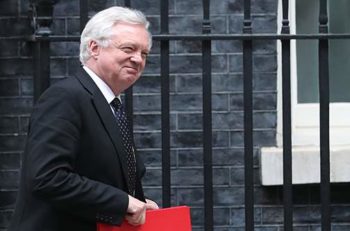
British Prime Minister, Theresa May, on Monday faced a crisis in her cabinet after Brexit Minister, David Davis, and one of his deputies resigned.
The duos resigned over a plan to retain strong economic ties to the EU even after leaving the bloc.
All eyes are on whether there will be further resignations by Brexit hardliners that could threaten May’s leadership, after junior minister, Steve Baker followed Davis out the door.
The Brexit ministry denied that junior minister Suella Braverman had also quit, and Davis himself said it would be “wrong” for his departure to create a full-fledged rebellion.
“I wouldn’t be encouraging people to do that,” he said in an interview with BBC radio, adding that “of course” May would survive.
May will address parliament later to explain her proposal for Britain to adopt EU rules on goods after Brexit, which she persuaded her divided cabinet to support during marathon talks on Friday.
Even ministers who want a clean break with Brussels agreed to the plan, finally giving May a proposal to take to the EU in the hope of agreeing a deal before Brexit in March 2019.
Foreign Secretary, Boris Johnson, a leading Brexit campaigner, criticised the plan in private but has so far has refrained from public comment.
But the truce did not last long, and Davis quit late Sunday with a scathing letter to May.
“The general direction of policy will leave us in at best a weak negotiating position, and possibly an inescapable one,” he said.
Speaking to the BBC, the long-time eurosceptic said he hoped his resignation would put pressure on May to make a stronger stand against the EU.
“It seems to me we’re giving too much away too easily and that’s a dangerous strategy,” he said.
“Hopefully we will resist very strongly any attempt to get any further concessions.”
He was later replaced by Dominic Raab, a eurosceptic junior housing minister.
In his letter, Davis said the deal agreed by the cabinet last week would “make the supposed control by parliament illusory rather than real”.
He was particularly critical of the plan for a “common rulebook” to allow free trade in goods, saying this “hands control of large swathes of our economy to the EU”.
He concluded that his post required “an enthusiastic believer in your approach, and not merely a reluctant conscript”.
May replied in a letter rejecting “your characterisation of the policy we agreed”, she said.
She said it would “undoubtedly mean the returning of powers from Brussels to the United Kingdom”.
May is due to address parliament later on Monday to explain her plan for Britain to adopt EU rules on goods after Brexit.
Davis was appointed two years ago to head up the newly created Department for Exiting the European Union after Britain voted to leave the bloc in a referendum.
Agency Report